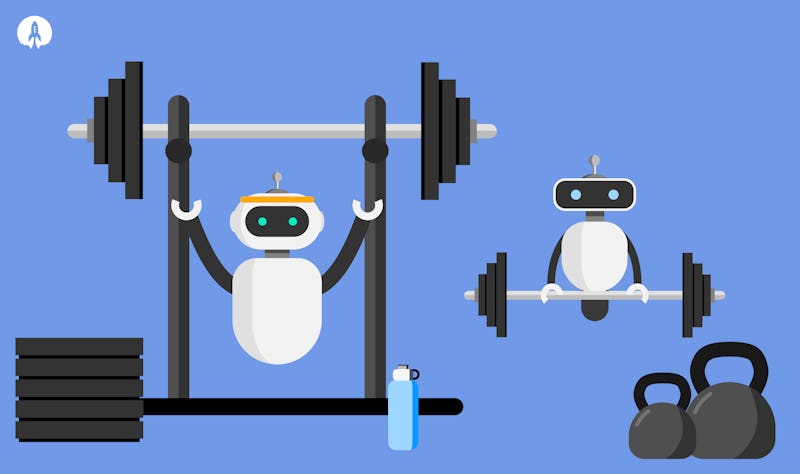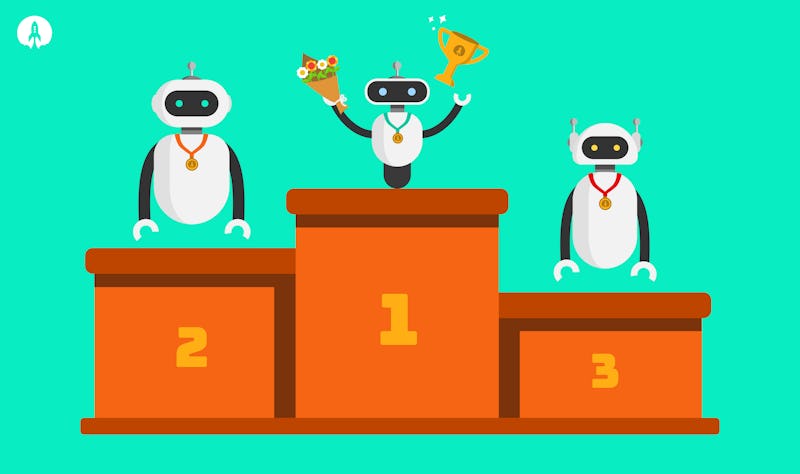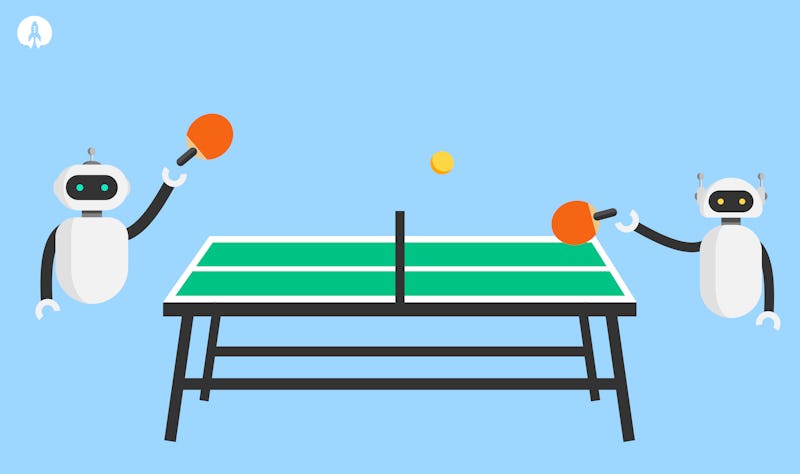
AI In Sports: How Artificial Intelligence Is Revolutionising The Sports Industry
Picture a world where athletes train with virtual coaches, offering real-time feedback and strategy adjustments based on performance data. Envision fans experiencing games through augmented reality, providing a stadium-like atmosphere in their living room. This future is not on the horizon; it's already here.
At the heart of this transformation is artificial intelligence (AI). AI and machine learning in sports are changing how athletes train, games are played, and fans enjoy sports.
In this article, we will look into how AI helps athletes improve their performance, assists coaches in strategy development, enhances the overall experience for sports fans, and ensures fairness and accuracy in officiating sports events.
Beyond these applications, we will also touch on the challenges and ethical questions of integrating AI into sports.
Let's dive into how AI shapes the future of sports and why it matters.
But First, What Is Artificial Intelligence?
AI, or artificial intelligence, refers to using computer systems that can perform tasks requiring human-like intelligence and decision-making.
In sports technology, AI can be used in tasks such as data analysis, performance tracking, injury prediction, tactical decision-making, and player scouting.
For example, AI can analyse large volumes of data from sensors and videos to provide coaches with detailed insights into player performance and health.
Below, we’ll discuss the applications of AI in sports.

✅ How AI Can be Used in the Sports Industry
Enhancing Athletic Performance
In today's world of competitive sports, big data is being used to enhance training capabilities and help prevent injuries.
Injury Prediction and Prevention
Injuries can derail an athlete's career, but AI is helping to change this. AI models can predict the risk of future injuries by analysing data on athletes' movements, training intensity, and past injuries.
This allows athletes and coaches to modify training regimens proactively, focusing on prevention. Wearable technology that constantly monitors an athlete's physical state and provides real-time feedback also plays a crucial role here.
Imagine an athlete wearing a device that tracks their movements, heart rate, and other physical indicators during training and games. This device collects vast amounts of data over time, including the athlete's normal range of motion, physiological responses to different exercises, and any deviations from their typical patterns.
An AI system analyses this data, looking for patterns and anomalies. It compares the athlete's data with historical data from other athletes, including instances where specific patterns of movement or physiological responses preceded injuries. By identifying these risk patterns, AI can predict when an athlete may be risking an injury.
The ultimate goal is to prevent injuries before they happen, keeping the athlete healthier and extending their career.
Data-Driven Insights on Individual and Team Performance
AI excels in breaking down complex performance data into actionable insights. It can analyse hours of game footage in minutes to identify patterns and areas for improvement that human observers might miss.
This player performance analysis isn't just about the physical aspects; it also analyses tactical and strategic elements of the game.
For instance, AI can help a basketball team identify their opponent's defensive weaknesses or a football team's preferred formations in various game situations.

Predictive analytics in AI is powerful because it processes large data sets to predict future trends and outcomes. It's particularly effective in sports to prevent injuries, improve player performance, and strategise.
This technology identifies patterns that may not be obvious, which enables proactive, informed decision-making. Essentially, it provides a strategic edge by anticipating future scenarios based on current data, making it a valuable tool for sports organisations.
Personalised Training
One of AI's most significant contributions to sports is its ability to personalise athlete training. This is because AI can handle and make sense of a lot of data quickly and in real-time.
Athletes and coaches can use this information to boost performance and understand each athlete's unique strengths and weaknesses. Based on this data, they can make smarter decisions about training and how to improve.
A good example is Catapult's Sports. This sports analytics platform uses sensors and cameras to track athletes' movements during training and games.
These sensors collect data on speed, distance, acceleration, and workload. Their AI algorithms then process this data to analyse the athlete's movement efficiency, form, and technique.
The software provides detailed insights and feedback, allowing coaches and athletes to make informed decisions about training and performance improvement.
Feedback and Real-time Adjustments
AI-powered wearable devices can monitor vital stats like heart rate, body temperature, and speed during training or competition, providing real-time feedback.
This allows athletes to adjust their performance on the fly. AI's machine learning algorithms can analyse vast amounts of performance data and pinpoint areas for improvement, which are crucial for athletes aiming to reach their peak performance.
For example, a runner might adjust their form immediately based on feedback from a wearable device, or a swimmer might change their stroke rhythm in response to real-time data about their performance.

✅ Enhancing Game Strategies and Tactics
Data is at the heart of AI's application in game strategy. AI algorithms need big datasets to analyse and learn from.
The more data they have, the more accurate and insightful their analyses become. Sports teams and organisations increasingly recognise AI's value in gaining insights.
Pre-Game Strategy: Analysing Opponents with AI
In competitive sports, understanding your opponent is half the battle. AI plays a critical role here. Teams use AI to analyse past game footage, player statistics, and social media behaviour.
This analysis helps identify the patterns, strengths, weaknesses, and potential strategies of the opposing team, allowing for the development of targeted game plans.
Real-Time Decision-Making
AI's impact isn't confined to pre-game preparations. During the game, AI tools provide real-time data and insights, assisting coaches and players in making informed decisions.
For instance, AI can suggest tactical adjustments in response to the opponent's strategy, predict the outcome of certain plays, or recommend player substitutions based on fatigue levels and performance data.
Post-Game Analysis
After the game, AI tools help teams reflect and learn. By analysing game data, teams can understand what worked well and what didn’t.
This involves breaking down key moments of the game, evaluating player performances, and assessing the effectiveness of strategies. This post-game analysis is crucial for continuous improvement, allowing teams to adapt and evolve their tactics for future games.
✅ Fan Engagement and Experience
About 57.5 million people watch live sporting events regularly every month. That number is set to increase to over 90 million by 2025.
Teams worldwide are harnessing AI to transform fan experiences to keep them coming back. A great example of this was seen at Wimbledon. This year, Wimbledon partnered with IBM to integrate AI audio commentary and captions into online highlight videos.
Here are a few ways more ways that artificial intelligence can impact the fan experience:
➡️ Personalisation
In the digital age, sports fans crave personalised experiences, and AI is making this possible. AI algorithms analyse fan preferences and behaviours to tailor content, such as recommending videos, articles, or games based on individual interests.
This personalisation extends to fantasy sports, where AI helps fans make data-driven decisions for their virtual teams. The use of machine learning algorithms also extends to sports betting.
➡️ Enhancing Real-Time Engagement during Games
AI is revolutionising how fans engage with live sports. Real-time data analysis allows instant statistics and insights to be shared with fans, enriching the viewing experience.
AI-powered apps and platforms provide play-by-play analytics, player performance data, and predictive game outcomes, keeping fans engaged and informed.
A great example of this is La Liga’s Beyond Stats platform. This modern technology provides fans with real-time and in-depth analyses of player performance, goal probabilities, personalised content, and enhanced live broadcasts with AI-generated graphics.
➡️ Social Media and Interactive Platforms
Social media is a vital part of the modern sports experience, and AI enhances this aspect, too.
AI tools help manage and personalise content on social platforms, ensuring that fans receive relevant and engaging posts.
Additionally, AI-driven chatbots on these platforms provide instant responses to fan queries, creating a more interactive and responsive fan experience.
➡️ Virtual Reality (VR) and Augmented Reality (AR) Experiences
AI-powered virtual reality is creating immersive fan experiences. Fans can now enjoy virtual stadiums, experience games from the player's perspective, or get a 360-degree view of live events, all from their homes.
This technology is not only enhancing the viewing experience, but also opening new avenues for fan interaction.
➡️ AI in Sports Journalism
In sports broadcasting, AI automatically edits, compiles highlights, and provides broadcasters with real-time statistics and historical data.
This enriches the viewing experience and gives commentators additional insights to share with the audience.

✅ Making Sports Fairer
Anyone who has watched a live sports match knows that being an umpire or referee is a thankless, high-pressure job. The job requires people to make split-second decisions, which can lead to controversy. Does anyone remember Diego Maradona’s “Hand of God” incident at the 1986 soccer World Cup?
For a long time now, various technologies, from simple stopwatches to advanced video assistant technology tools like Hawk Eye, have been used to make sporting events more fair. But recently, AI has upped the ante.
For the first time during the FIFA World Cup in Qatar in 2022, for example, AI aided referees by tracking player positions via different camera angles and a sensor in the ball.
These systems analyse video footage in real-time, assisting officials in making more informed decisions and significantly reducing human error in officiating.
Also, in boxing, Jabbr's DeepStrike gathers detailed match data and turns it into 50 important measures for each fighter. This helps spot unfair moves like low blows or headbutts to combat cheating in the sport.
Training and Supporting Officials
AI tools are not just used for in-game decisions; they are also valuable in training referees and officials.
By analysing large sets of game data, AI can identify common situations and decision-making patterns, which can be used in training programmes to improve the skills and judgment of officials.
✅ Talent Scouting
AI is significantly transforming the process of scouting and evaluating athletes in sports. Before AI, talent scouts largely depended on their experience and judgment to spot promising athletes.
Now, with AI technology, they can access sophisticated programs that analyse a wide range of data for more precise talent identification.
These AI tools can review various aspects like a player's past performance statistics and even analyse video footage to get a clearer picture of an athlete's abilities and potential.
By using AI, scouts and sports teams can uncover talented athletes who might have gone unnoticed with traditional scouting techniques. They also have access to a global talent pool, giving more opportunities to promising young athletes.
AI ensures that decisions are made on thorough, data-based analysis rather than subjective opinions.
This streamlines the scouting process, saving time and effort and giving teams a competitive edge by discovering skilled athletes whom others may have overlooked.
Predictive Analytics in Identifying Future Stars
Predictive analytics is a significant aspect of AI in talent scouting. Based on current data trends, AI systems can predict an athlete's future performance and potential. The capability to predict athletes' physical and skill development over time is invaluable in sports.
✅ Optimising Sports Business
AI plays a significant role in the business side of sports, transforming various aspects from marketing and ticket sales to revenue optimisation. Here's an overview:
➡️ Ticket sales and pricing optimisation: AI algorithms can predict demand for games and events, which helps set dynamic ticket pricing. By analysing factors like team performance, opponent strength, and historical attendance, AI can optimise ticket prices to maximise revenue and attendance.
➡️ Merchandising and retail: In the merchandising domain, AI helps in predicting trends and consumer preferences, managing inventory, and personalising marketing. This leads to more efficient sales strategies and improved customer satisfaction.
➡️ Market research and fan insights: AI-driven analytics provide deep insights into fan demographics, preferences, and behaviours. This information is crucial for teams and sports marketers to understand their audience and develop targeted strategies.
➡️ Event management and operations: AI enhances event management efficiency by optimising logistics, security, and crowd management. For example, AI can predict and manage crowd flows to ensure safety and a better fan experience.
➡️ Performance analytics for business decisions: Just as AI assists in athlete performance analytics, it helps sports businesses analyse their operational efficiency, financial performance, and strategic decision-making.

Ethical Considerations of Sports Artificial Intelligence
Artificial intelligence (AI) is changing how we approach sports, from how games are played to how fans enjoy them.
While AI could potentially improve many sports aspects, its use raises important ethical questions.
These include concerns about protecting athletes' data, ensuring fairness, and keeping the human element in sports. In this section, we'll look at these ethical issues.
⚠️Data Privacy and Security
AI systems are capable of collecting and analysing athletes' data, including biometric and health data. Significant concerns exist regarding who has access to this data, how it is used, and how it is protected from unauthorised access or breaches.
The consent of athletes in data collection is a critical issue. Clarity on what data is being collected, how it will be used, and the athletes' right to opt out, is essential.
⚠️Inherent Biases
AI systems can inadvertently perpetuate and amplify biases in their training data. In sports, this could manifest in biased scouting reports, unfair performance evaluations, or discriminatory player selection and development practices.
Ensuring fairness in AI algorithms is challenging, especially when historical data may reflect past biases or inequalities.
⚠️Impact on Athletes
AI in performance monitoring can become stressful for athletes, making them feel constantly watched and judged. It risks regarding them as data sets and ignoring human elements like intuition, game-changing creativity, and emotion in sports.
⚠️Autonomy and Human Judgment
Relying too much on AI can overshadow human insight in sports. It's important to balance AI tools with the invaluable judgment of coaches and athletes to preserve the integrity of sports.
⚠️Accessibility and Equity
The high cost and complexity of AI technologies in sports can create disparities between well-funded and less-resourced teams or athletes, potentially widening gaps in performance and opportunities.
This raises concerns about equity and fairness in competition, as access to advanced AI tools might become a significant advantage.

“It's clear that tackling AI's ethical issues in sports needs teamwork. Ethics is everyone’s responsibility, so we need technologists, sports pros, and athletes working together.
Setting up clear ethical rules and standards for AI use in sports is crucial. This way, we ensure AI is used right and benefits everyone in sports".
Final Thoughts
The emergence of the AI sports industry is just beginning to gain traction. As this technology evolves, its potential to transform every aspect of sports – from training to gameplay and fan engagement – will only grow.
In this rapidly changing landscape, embracing AI is not just about staying competitive – it's about pushing the boundaries of what's possible in sports.
As we stand on the cusp of a new era in sports technology, the opportunities for innovation and advancement are limitless for businesses looking to make their mark.
🚀Let's Create the Sports Technology of Tomorrow, Today
Don't just watch the future of sports unfold – be a part of it. We’re experts in AI and sports technology and have worked with multiple sports technology innovators such as the English Institute of Sport, Bath Racing, and the Ineos Grenadiers to develop cutting-edge software solutions tailored to high-performance athletes.
Whether you want to develop your ideas or collaborate on innovative projects, we're here to turn your vision into reality.
Connect with us today. We’d love to hear from you!
